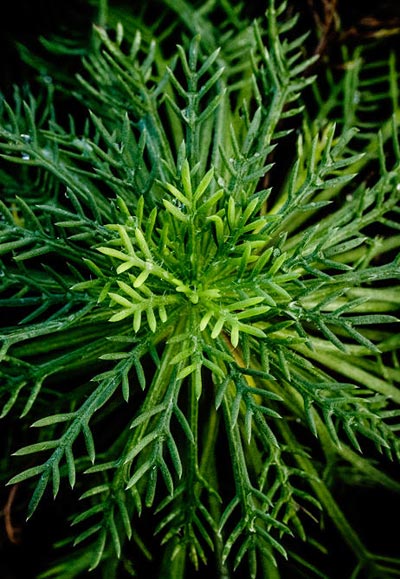Some plants regenerate by duplicating their DNA

Some cultivars of the plants Arabidopsis thaliana (used in the study) and Ipomopsis aggregata (pictured here) can duplicate their genomes multiple times without undergoing cell division. | Photo by L. Brian Stauffer
They report their findings in the journal Molecular Ecology.
Their study is the first to show that a plant’s ability to dramatically rebound after being cut down relies on a process called genome duplication, in which individual cells make multiple copies of all of their genetic content.
Genome duplication is not new to science; researchers have known about the phenomenon for decades. But few have pondered its purpose, said University of Illinois animal biology professor Ken Paige, who conducted the study with postdoctoral researcher Daniel Scholes.
“Most herbaceous plants – 90 percent – duplicate their genomes,” Paige said. “We wanted to know what this process was for.”
In a 2011 study, Paige and Scholes demonstrated that plants that engage in rampant genome duplication also rebound more vigorously after being damaged. The researchers suspected that genome duplication was giving the plants the boost they needed to overcome adversity.
That study and the new one focused on Arabidopsis thaliana, a plant in the mustard family that often is used as a laboratory subject. Some Arabidopsis plants engage in genome duplication and others don’t. Those that do can accumulate dozens of copies of all of their chromosomes in individual cells.
In the new study, Scholes crossed Arabidopsis plants that had the ability to duplicate their genomes with those that lacked this ability. If the relationship between DNA duplication and regeneration was mere happenstance, the association between the two should disappear in their offspring, Scholes said.
“But the association persisted in the offspring,” he said. “That’s the first line of evidence that these two traits seem to be influencing each other.”
To further test the hypothesis, Scholes experimentally enhanced an Arabidopsis plant’s ability to duplicate its genome. He chose a line that lacked that ability and that also experienced a major reduction in fertility after being grazed.
As expected, the altered plant gained the ability to vigorously rebound after being damaged, the researchers reported.
“We were able to completely mitigate the otherwise detrimental effects of damage,” Scholes said. “There was no difference in fertility between damaged and undamaged plants.”
Genome duplication enlarges cells and provides more copies of individual genes, likely increasing the production of key proteins and other molecules that drive cell growth, Scholes said. Future studies will test these ideas, he said.
The National Science Foundation and U. of I. Research Board funded this research.
Media Contact
More Information:
http://news.illinois.edu/news/14/1111chromosomes_KenPaige.htmlAll latest news from the category: Life Sciences and Chemistry
Articles and reports from the Life Sciences and chemistry area deal with applied and basic research into modern biology, chemistry and human medicine.
Valuable information can be found on a range of life sciences fields including bacteriology, biochemistry, bionics, bioinformatics, biophysics, biotechnology, genetics, geobotany, human biology, marine biology, microbiology, molecular biology, cellular biology, zoology, bioinorganic chemistry, microchemistry and environmental chemistry.
Newest articles

Webb captures top of iconic horsehead nebula in unprecedented detail
NASA’s James Webb Space Telescope has captured the sharpest infrared images to date of a zoomed-in portion of one of the most distinctive objects in our skies, the Horsehead Nebula….

Cost-effective, high-capacity, and cyclable lithium-ion battery cathodes
Charge-recharge cycling of lithium-superrich iron oxide, a cost-effective and high-capacity cathode for new-generation lithium-ion batteries, can be greatly improved by doping with readily available mineral elements. The energy capacity and…

Novel genetic plant regeneration approach
…without the application of phytohormones. Researchers develop a novel plant regeneration approach by modulating the expression of genes that control plant cell differentiation. For ages now, plants have been the…





















